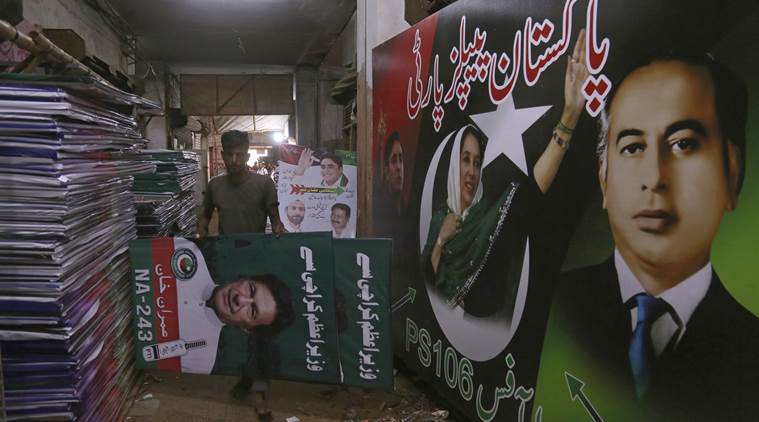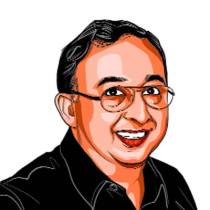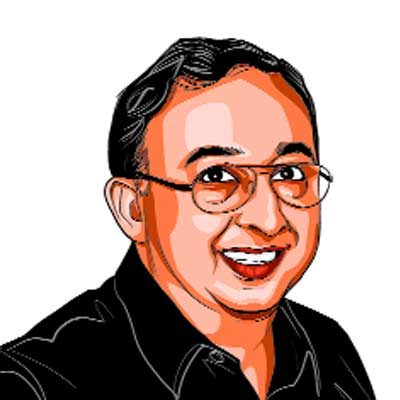Hardliners on the ballot
Pak army’s political tinkering is setting the stage for electoral rise of fundamentalists

A Pakistani worker arranges newly printed posters of candidates for the upcoming parliamentary elections at a workshop in Karachi, Pakistan, Tuesday, June 26, 2018. Pakistan is scheduled to hold parliamentary elections on July 25, that will mark the first time the country has held three consecutive elections without a coup. (AP Photo)
The July 25 elections in Pakistan are likely to establish long-term trends that would be harmful for whatever little plurality is left in the country. The electoral contest has been billed as being between Nawaz Sharif’s Pakistan Muslim League (PML-N) — even though he is debarred from contesting or holding a party office — and Imran Khan’s Pakistan Tehreek-e-Insaf (PTI). However, the real story of these elections is the army’s political engineering that has created the space for the electoral rise of the hardline religious right.
In an attempt to “mainstream” the “good” jihadis, Hafiz Saeed, the Lashkar-i-Toiba (LeT) supremo, was allowed to set up a political party — the Milli Muslim League (MML) — in August 2017. This would have allowed cadres of the Jamaat-ud-Dawa (JuD)/LeT to contest the elections. However, since the Election Commission of Pakistan (ECP) did not register the MML as a political party, the LeT cadres will now be contesting under the banner of the Allah-o-Akbar Tehreek (AAT), a registered political party. They are set to contest as many as 80 National Assembly (NA) and 185 Punjab provincial assembly seats. The candidates include Hafiz Saeed’s son, Hafiz Talha Saeed, and son-in-law, Khalid Waleed.
Crucially, the ECP has no mechanism to determine if any candidate is on the Fourth Schedule (involvement in terrorist activities) of the Anti-Terrorism Act (ATA), 1997 and debar him from contesting. Thus, one Qari Sheikh Yaqoob, a US-designated global terrorist and member of the central advisory committee of the JuD, was able to contest a byelection in Lahore in September 2017. It is, therefore, very likely that several Lashkar terrorists would be contesting the July 25 general elections.
Equally shocking is that Ahmed Ludhianvi, head of the rabidly anti-Shia banned sectarian organisation Ahle-Sunnat Wal Jamaat (ASWJ, earlier Sipah-e-Sahaba), has been taken off the Fourth Schedule of the ATA. His assets have been unfrozen, restrictions on his travel removed and he is free to contest elections. The irony is that this development came on the day Pakistan announced a 26-point plan against terrorist financing in order to avoid being blacklisted by the Financial Action Task Force (FATF). The sectarian terrorists of the ASWJ will be contesting from the platform of the Pakistan Rah-e-Haq Party, since the ASWJ is banned. The candidates include the Sindh president of the party, Aurangzeb Farooqi, whose nomination papers have been accepted by the ECP even though he is on the Fourth Schedule.
The ASWJ is closely associated with the Lashkar-e-Jhangvi (LeJ) that has been responsible for several large-scale attacks in the country, mainly targeting Shias. It has also become an Islamic State (IS) affiliate and the two groups have jointly carried out a number of attacks in the past few years.
Another hardline religious party in the political fray is the Barelvi Tehreek-e-Labbaik Pakistan (TLP), an electoral front of the Tehreek-e-Labbaik Ya Rasool Allah (TLYRA). It was registered with the ECP in July 2017. It burst on the political scene during a Lahore byelection in September 2017 securing more votes than the Pakistan People’s Party (PPP) and the Jamaat-i-Islami (JI), reflecting voter disenchantment with the mainstream political parties. Later, it consolidated itself by bringing Islamabad to a halt when it staged a sit-in at the Faizabad interchange that was lifted only after the army intervened.
All these parties are in for the long haul. How many seats they actually win is debatable, though they could garner a sizeable vote share. In the process, they could be “spoilers” in close contests between the PML-N and PTI in Punjab.
For the long-term, what is significant is whether these hardline religious parties are able to occupy and even expand the political space so far held by the mainstream religious parties like the Jamiat-ulema-i-Islam (JUI-F) and the JI. These parties are also in the electoral fray, having revived the Muttahida Majlis-i-Amal (MMA) alliance crafted under Pervez Musharraf. The new groups, however, are far more belligerent, intolerant and judgmental than the mainstream religious parties and do not really believe in democracy, which they consider un-Islamic. Their success in the 2018 elections and subsequent ones, even in terms of vote-share, would make Pakistan lurch further to the right and choke the space for a moderate and inclusive state. After all, the “mainstreaming” of terrorists without de-weaponisation, de-radicalisation and re-education could have disastrous consequences for the polity.
While India will have to deal with whichever party comes to power, ultimately it will, as always, have to contend with the army’s mindset. What needs to be watched is the depth and breadth of the political footprint of the religious parties, especially the LeT. This will have long-term implications for India.
Devasher is the author of Pakistan: Courting the Abyss and Pakistan: At the Helm. He is a former special secretary, Cabinet Secretariat, Government of India and consultant, Vivekananda International Foundation
For all the latest Opinion News, download Indian Express App
More From Tilak Devasher
- Generals and their doctrinesIn commenting on civilian issues, Pakistan army chief continues a tradition..
- The Gilgit- Baltistan feintThere are serious impediments to declaring the region Pakistan’s fifth province. The issue has been raised to placate China and distract India..
- An Opportunity, A BurdenPakistan’s unrealised demographic dividend could add to its problems...








































No hay comentarios:
Publicar un comentario